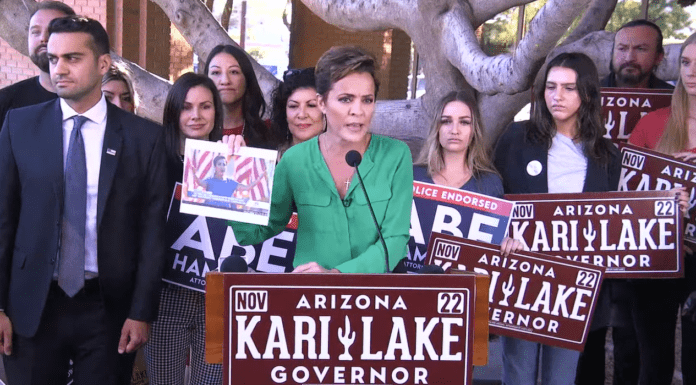(Dmytro “Henry” Aleksandrov, Headline USA) It was reported that Kari Lake’s lawsuit request to view signed ballots of 1.3 million early voters in Arizona was rejected by a Maricopa County Superior Court judge.
Judge John Hannah’s ruling that was filed on Nov. 30, 2023, denied Lake from gaining access to the envelopes in connection to the 2022 gubernatorial race that she supposedly “lost” to Katie Hobbs, according to The Hill.
Hannah tried justifying the covering up of the actual results of the state’s 2022 election by arguing that the release of the ballot envelopes and their signatures would undermine the ballot verification process for future elections.
“The broad right of electoral participation outweighs the narrow interests of those who would continue to pick at the machinery of democracy,” he wrote.
The Arizona Republic obtained the filings that indicated that 84% of the ballots that were processed during last year’s general election cycle were early ballots.
It was also reported that the County Recorder’s office that was responsible for verifying the ballots found 16,000 inconsistent signatures, later determining that 14,200 of them were lawful voting citizens, with the remaining 1,800 envelopes never being opened or counted, The Hill wrote.
The case was filed in April by Lake against County Recorder Stephen Richer’s office under the Arizona Public Records Law.
Giving the ballots to Lake creates a “risk of widespread fraud where none exists at present” since the envelopes contain personal information like names, addresses and phone numbers of voters, according to Hannah’s ruling.
In the state of Arizona, early voting envelopes serve as an affidavit in which voters declare that they are registered to vote and haven’t already voted in that election.
Hannah also said that it creates the “real possibility of voter harassment,” adding that it could corrode public confidence in the electoral process.
The 12-page ruling also detailed how during the case’s trial in September, a former election worker testified about her receiving threats after videos were posted online showing her preparing equipment for a subpoena from the state Senate’s review of the 2020 election.

